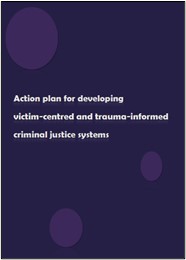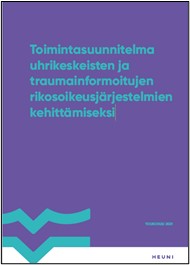The Action plan aims to give ideas and examples for developing victim-centred and trauma-informed criminal justice systems. The Action plan compiles concepts from research, reports, and past projects as well as examples of models and ways of working that have been developed and used by the partner organisations and the respective authors of each chapter. The Action plan combines knowledge and ideas from different disciplines, most notably law, criminology, and psychology. Each chapter is written by a particular expert and each chapter represents the author’s expertise and opinions.
The Action plan builds on the idea that the protection of victims should be understood and achieved on multiple fronts, via legislation, in criminal proceedings as well as in society. Taking a victim-centred approach to how the criminal justice system processes the needs of victims, means treating victims with care and respect and recognising the difficulties and challenges faced by those who have experienced crime. A key issue is that as long as practitioners consider violent crimes as a matter between the state and offenders, and not as one involving victims, it will remain difficult to give victims the important role in the proceedings that is in line with their needs and the interests of justice.
Victims of crime should be protected against repeat victimisation, they should be granted access to justice, and it should be made possible for them to participate in the criminal proceedings, in line with Article 47 of the EU Charter of Fundamental Rights. The way in which victims are treated cannot be improved through legislative reforms alone. The protection of the rights of victims should be implemented effectively at the practical level. An effective way to meet the needs of victims is to create and use tools in order to provide legal, social, psychological, and financial support to victims in order to ensure effective assistance. In this Action plan, we first discuss structural issues such as legislation and processes, including the importance of cooperation between the criminal justice system and assistance providers, and how to provide victims with information on their rights. Then, we move on to an understanding of what trauma is, how it is manifested in the criminal justice system and how criminal justice actors can in practice provide justice and support services in a trauma-informed manner.
Tämä toimintasuunnitelma on kehitetty Euroopan unionin oikeusalan rahoitusohjelman rahoittaman Kohti uhrikeskeisempää rikosjärjestelmää (RE-JUST) -hankkeen1 osana. Toimintasuunnitelman laatijat työskentelevät asiantuntijoina seuraavissa organisaatioissa: Association Pro Refugiu (Romania), Center for the Study of Democracy (Bulgaria), SOLWODI Deutschland e.V. (Saksa), Yhdistyneiden Kansakuntien yhteydessä toimiva Euroopan kriminaalipolitiikan instituutti HEUNI (Suomi) ja Dinamia S. Coop (Espanja). Toimintasuunnitelman tavoitteena on tarjota ideoita ja esimerkkejä uhrikeskeisten ja traumainformoitujen rikosoikeusjärjestelmien kehittämiseen. Toimintasuunnitelma kokoaa tutkimuksissa, raporteissa ja aiemmissa hankkeissa esitettyjä konsepteja sekä kuvailee kumppaniorganisaatioiden ja eri lukujen kirjoittajien kehittämiä ja käyttämiä toimintamalleja ja työtapoja. Toimintasuunnitelma yhdistää eri tieteenalojen — etupäässä oikeustieteen, kriminologian ja psykologian — tietoa ja lähestymistapoja. Jokainen luku on eri asiantuntijan kirjoittama ja heijastaa hänen osaamistaan ja mielipiteitään. Toimintasuunnitelma perustuu ajatukseen, että uhrien suojelua olisi lähestyttävä ja toteutettava usealla tasolla samanaikaisesti — niin lainsäädännössä, rikosprosessissa kuin yhteiskunnassa laajemmin. Uhrikeskeinen lähestymistapa uhrien tarpeiden käsittelyyn rikosoikeusjärjestelmässä tarkoittaa rikoksen uhriksi joutuneiden haasteiden tunnistamista ja uhrien huomaavaista ja kunnioittavaa kohtelua. Keskeisenä ongelmana on, että niin kauan kuin väkivaltarikokset mielletään valtion ja tekijän väliseksi asiaksi, uhreille on vaikea antaa heidän tarpeidensa ja oikeuksiensan toteutumisen edellyttämää keskeistä roolia prosessissa.


